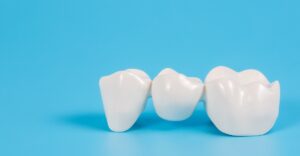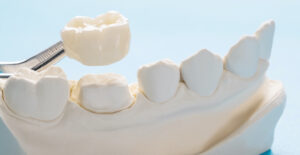A crown is a restoration that "caps" a tooth to restore it to its normal shape and size, strengthening and improving the appearance of a tooth.
Crowns are recommended when a tooth is so decayed or fractured that a filling would not be the appropriate solution. Crowns are also used to support a large filling when there isn’t enough of the tooth structure remaining, as a retainer for a bridge,or to cover badly shaped or discolored teeth.
Porcelain Crowns
Porcelain (tooth colored crown) is a very popular choice because they resemble your natural teeth. They are highly durable.
Dental Crown – Facts
To prepare the tooth for a crown, it is reduced so the crown can fit over it. An impression of teeth and gums is made and sent to the lab for fabrication of the crown. A temporary crown is cemented over the tooth until the permanent crown is ready. On the next visit, the dentist removes the temporary crown and cements the permanent crown onto the tooth. Advanced technology has now made it possible for crowns to be made in one visit, eliminating the need for impressions, repeated visits to the dental office and reduced time in the dental chair.
Dental Crown – Durability
Crowns usually last about 8-10 years. However, with good oral hygiene and supervision most crowns will last for a much longer period of time. Some damaging habits like clenching your teeth or crunching on ice may compromise the longevity of the crown.
Cleaning between your teeth is of special importance when you have crowns. Flossing or using interdental cleaners is effective in removing plaque, which can cause dental decay and gum disease, from the crown area especially around the gumline. And most importantly, visit your dentist for regular hygiene visits.







